
China UN Ambassador Liu Jieyi, left, and France UN Ambassador Francois Delattre, raise their hands during a UN Security Council vote on a French-sponsored counter terrorism resolution, aimed at Islamic extremist, Friday, Nov. 20, 2015 at UN headquarters. The Security Council unanimously approved the resolution, calling on all nations to redouble and coordinate action to prevent further attacks by Islamic State terrorists and other extremist groups. AP
UNITED NATIONS — Russia hopes to circulate a draft resolution to the Security Council very soon that will tighten the UN crackdown on the financing of extremist groups including the Islamic State group, the country’s UN ambassador said Tuesday.
Vitaly Churkin told The Associated Press that the resolution will be a follow-up to the Russian-sponsored resolution adopted unanimously on Feb. 12 which is aimed at halting illicit oil sales, trading in antiquities, and ransom payments for hostages that are key methods used by extremist groups to finance their operations.
“We’re working on it,” Churkin said. The resolution will be circulated “very soon. It’s not a complicated thing.”
Moscow gave copies of the draft to the United States, China and a few other council members late last week but the entire 15-member council has not yet received it.
US Ambassador Samantha Power told a news conference later Tuesday that the Russian effort is focused on something the United States is also focused on — the need to halt the Islamic State group’s ability to access funds “whether through oil sales or through moving money through the international financial system.”
“So we have a shared objective there, and from a shared objective, hope springs eternal,” Power said.
As the Security Council president for December, Power said members will also be discussing a new resolution on the sanctions regime against al-Qaida and the Islamic State group. So the council will be looking to see how the Russian draft and the new sanctions resolution overlap, conflict, or can come together, she said.
READ: Why do extremists drive Toyotas?, US asks
The resolution adopted in February calls for sanctions on individuals and companies trading oil produced by the Islamic State and other extremist groups.
It reaffirms that it is illegal to pay ransom to individuals and groups — such as the Islamic State and Jabhat al-Nusra — that are already subject to UN sanctions, and that all countries are required to freeze such funds.
And it requires all 193 UN member states to take “appropriate steps” to prevent the increasing trade in antiquities and other items of historical, cultural, rare scientific and religious importance illegally removed from Syria. A similar ban already existed for antiquities from Iraq.